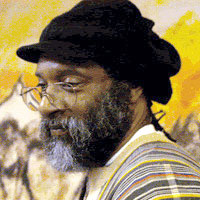Black History Month Profile: Mwatabu Okantah

Mwatabu Okantah, assistant professor of Pan African Studies
During Black History Month, the Daily Kent Stater will feature a leader in Kent State’s African American community. These people will describe their involvement in the African American community on campus, how the community has changed over time and who will be its leading voices in the future.
Black History Month Highlight: Mwatabu Okantah, assistant professor of Pan African Studies
Mwatabu Okantah is a Griot — a member of a group of traveling poets, musicians and storytellers who maintain the oral history and culture of West Africa.
Okantah, an assistant professor of Pan African Studies, is the leader of his Griot group, the Muntu Kuntu Energy Ensemble.
As the department’s poet-in-residence, he has traveled the world with his rhythmic poetry and motivational speaking.
He has performed in many locations throughout the United States and West Africa and has received recognition from groups such as the 5th Edition of Who’s Who Among Teachers in America, Who’s Who in Poetry and the International Biographical Center’s Outstanding Writers of the 20th Century.
During his time in Africa, he was named a Rotary International Group Study Exchange Fellow in Nigeria in 1998. He also served as a special guest guide for Sankofa Tours in Senegal and Ghana in 1994.
He has worked with various musical ensembles throughout his career in the arts such as Cavani String Quartet.
Okantah has also taught at Union College, The Livingtson College of Rutgers University, Cleveland State University and Lakeland Community College.
He graduated from Kent State in 1976 and pursued his master’s degree in creative writing from the City College of New York in New York City.
He returned to Kent State University in 1991 as professor in the Pan African Studies department. He also currently serves as the Director of the Center of Pan-African Culture.
According to Okantah, he will soon be an associate professor. He said his greatest life accomplishments are marrying his wife and raising his children.
Since you have started working at Kent State University, how have you seen the African American presence and involvement on this campus evolve?
I have a unique perspective because I was a student here in the 1970s. I was groomed by older members of Black United Students. We were one of the most active black student groups in the state if not the country. Now as a faculty member, I am seeing the fruits of our labor here in the present. There was no department of Pan African Studies when I graduated. We were presented with a clear and visible need. So, it is extraordinary to be a professor in this department now. In fairness to current students, there is a disconnect.
Who do you think the new and upcoming African American leaders are on this campus?
Professor Tracey Easely Williams is the link between Journalism and Mass Communication in Franklin Hall and Pan African Studies in Oscar Ritchie Hall.
Professor Idris Syed is also a prominent professor in Pan African Studies. We have grown faculty members. I have had both of these (current) professors as students in the 90s here at Kent State.
How do you see the African American student body evolving on this campus in the future?
By coming to work and doing my job every day, I have the unique opportunity to utilize what I learned in Black United Students. It is my job now. I hope to see students take advantage of their resources to continue to be involved on campus.
Contact Kara Taylor at [email protected].


